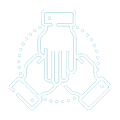Addiction Therapist
Addiction Psychologists
Addiction is an extremely common yet largely untreated Mental Health Disorder that affects your mental health, physical health, job performance, relationships, and so much more. There are two categories of addiction: substance abuse disorders and behavioral addictions. Substance-based addictions include Alcohol Addiction, Drug and Substance Abuse, and similar conditions. Behavior-based addictions incorporate addictions to activities or habits, such as gambling, shopping, or sex. Without proper treatment from an expert in Counseling services, both substance addictions and behavioral addictions will take a toll on your overall well-being.
Common 21st-century addictions include sex, pornography, food, drugs, alcohol, gambling, cell phones/devices, and social media. These addictions often have their roots in depression and anxiety. Addiction help and mental health treatment are interconnected for this reason; helping you overcome an addiction to any one of these stimuli will involve helping you resolve your anxiety or depression first.
Dr. Blair, known as one of the best Addiction Psychologists in Los Angeles, Beverly Hills, Irvine, Newport Beach, and the Orange County area. She has the training, experience, and insights to treat a wide variety of addictions. Through comprehensive Counseling services and tailored treatment plans featuring evidence-based therapy models, she treats relationship addiction and love addiction to help you overcome substance abuse, drug abuse, alcohol addiction, or mood disorder that may exist in conjunction with addiction issues. Treatment from an addiction psychologist also involves overcoming stress management or anger management.
Counseling sessions for addiction recovery helps you overcome symptoms, build healthier thought patterns, create new associations, and adaptive behaviors to overcome your addiction. Finding addiction recovery is a big step, but it’s an essential part of addressing the underlying issue to regain control over your life. That’s why Blair Wellness Group provides addiction treatment, counseling services, and evidence-based therapy models to treat addictions, mood disorders, personality disorders, and any underlying conditions.
Addiction or substance abuse treatment with Dr. Blair can include treatment modalities such as cognitive behavioral treatment, dialectical behavioral treatment, or crisis intervention treatment combined with scientific-based treatment models and even inpatient hospitalization for acute intervention in patients who are not compliant, lack family support, and experience severe symptoms or adverse health issues related to their addictions. As your Addiction Therapist in Los Angeles, Beverly Hills, Irvine, Newport Beach, and the surrounding areas, Dr. Blair will find a way to help you overcome your addiction and regain your quality of life and health.
Other Service
-
Alcohol AddictionAlcohol Addiction
-
Drug and Substance AbuseDrug and Substance Abuse
-
Food AddictionFood Addiction
-
Gambling AddictionGambling Addiction
-
Gaming AddictionGaming Addiction
-
Pornography AddictionPornography Addiction
-
Sex AddictionSex Addiction
-
Social Media AddictionSocial Media Addiction

Office Hours
Mon - Fri : 7 am - 11 pm
Sat - Sun : 9 am - 10 pm

Office Number
310 999 4996
949 444 7427
Our Core Values
Discover effective solutions for addiction at Blair Wellness Group today. Call us at 310.999.4996 to schedule an appointment. We welcome patients from Beverly Hills, Los Angeles, Irvine, Newport Beach, and the surrounding areas.

Reliable
At Blair Wellness Group, we are here to meet your clinical needs at any time.

Dedicated Support
Our team provides the compassionate care, support, and necessary interventions needed for our clients to achieve their goals and clinical objectives.

Experience
With 15+ years of clinical experience in providing an array of psychological services, we are committed to helping our patients achieve their goals.

Professional Team Support
We are dedicated to the well-being of our clients and have the extensive training to provide them with high-quality care.
Looking for a Local Psychologist?
Our Psychologists and Therapists in Los Angeles, Beverly Hills, Irvine, Newport Beach, and the surrounding areas offer evening and weekend appointments for our Concierge patients. Contact us today to discover how Blair Wellness Group can help you overcome personal or professional challenges and mental health disorders, such as depression, anxiety, relationship challenges, addiction issues, and personality disorders.











